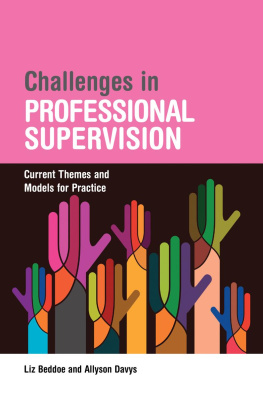Hawkins Peter - Supervision in the Helping Professions
Here you can read online Hawkins Peter - Supervision in the Helping Professions full text of the book (entire story) in english for free. Download pdf and epub, get meaning, cover and reviews about this ebook. City: Maidenhead u.a, year: 2012, publisher: McGraw-Hill Education, genre: Politics. Description of the work, (preface) as well as reviews are available. Best literature library LitArk.com created for fans of good reading and offers a wide selection of genres:
Romance novel
Science fiction
Adventure
Detective
Science
History
Home and family
Prose
Art
Politics
Computer
Non-fiction
Religion
Business
Children
Humor
Choose a favorite category and find really read worthwhile books. Enjoy immersion in the world of imagination, feel the emotions of the characters or learn something new for yourself, make an fascinating discovery.
- Book:Supervision in the Helping Professions
- Author:
- Publisher:McGraw-Hill Education
- Genre:
- Year:2012
- City:Maidenhead u.a
- Rating:5 / 5
- Favourites:Add to favourites
- Your mark:
- 100
- 1
- 2
- 3
- 4
- 5
Supervision in the Helping Professions: summary, description and annotation
We offer to read an annotation, description, summary or preface (depends on what the author of the book "Supervision in the Helping Professions" wrote himself). If you haven't found the necessary information about the book — write in the comments, we will try to find it.
In this book the seven-eyed supervision model is explored and developed to reflect its use in many professions and different parts of the world.
Supervision in the Helping Professions — read online for free the complete book (whole text) full work
Below is the text of the book, divided by pages. System saving the place of the last page read, allows you to conveniently read the book "Supervision in the Helping Professions" online for free, without having to search again every time where you left off. Put a bookmark, and you can go to the page where you finished reading at any time.
Font size:
Interval:
Bookmark:

Coaching and Mentoring Supervision: Theory and Practice by Tatiana Bachkirova, Peter Jackson and David Clutterbuck
Skills of Clinical Supervision for Nurses: A Practical Guide for Supervisees, Clinical Supervisors and Managers (Second Edition) by Meg Bond and Stevie Holland
Supervision in Action: A Relational Approach to Coaching and Consulting Supervision by Erik de Haan
Supervision in the Helping Professions (Fourth Edition) by Peter Hawkins and Robin Shohet
The Social Work Supervisor: Supervision in Community, Day Care, and Residential Settings by Allan Brown and Iain Bourne
Psychotherapy Supervision: An Integrative Rational Approach to Psychotherapy Supervision by Maria C. Gilbert and Kenneth Evans
Forthcoming in 2012:
Clinical Supervision in the Medical Profession: Structured Reflective Practice by David Owen and Robin Shohet
Open University Press
McGraw-Hill Education
McGraw-Hill House
Shoppenhangers Road
Maidenhead
Berkshire
England
SL6 2QL
e-mail: enquiries@openup.co.uk
world wide web: www.openup.co.uk
and Two Penn Plaza, New York, NY 101212289, USA
First published 1989
Second edition published 2000
Third edition published 2006
Reprinted 2008, 2009, 2010 (twice), 2011
First published in this fourth edition 2012
Copyright Peter Hawkins and Robin Shohet, 2012
Copyright Chapter 9, Peter Hawkins, 2012
All rights reserved. Except for the quotation of short passages for the purpose of criticism and review, no part of this publication may be reproduced, stored in a retrieval system, or transmitted, in any form or by any means, electronic, mechanical, photocopying, recording or otherwise, without the prior written permission of the publisher or a licence from the Copyright Licensing Agency Limited. Details of such licences (for reprographic reproduction) may be obtained from the Copyright Licensing Agency Ltd of Saffron House, 610 Kirby Street, London EC1N 8TS.
A catalogue record of this book is available from the British Library
ISBN13: 9780335243112 (pb)
ISBN10: 0335243118 (pb)
eISBN: 9780335243549
Library of Congress Cataloging-in-Publication Data
CIP data applied for
Typesetting and e-book compilations by
RefineCatch Limited, Bungay, Suffolk
Printed and bound in the UK by Bell & Bain Ltd, Glasgow
Fictitious names of companies, products, people, characters and/or data that may be used herein (in case studies or in examples) are not intended to represent any real individual, company, product or event.

This book remains a seminal text in supervision. In the fourth edition the authors bring a contemporary perspective to bear on supervision with an emphasis on the wider contextual and cultural contexts of our work as supervisors. I appreciate above all the fearless compassion with which the authors have addressed the challenges that face us as supervisors in a global culture, and at the same time their ongoing stress on integrating the emotional and the rational, the personal and the organizational in a very accessible model of supervision.
Professor Maria Gilbert, Metanoia Institute, West London, UK
Supervision in the Helping Professionsremains a core text in our trainings and we welcome the updates, including the increased focus on ethics and diversity, the discussion of e-enabled modes of supervision and the review of research. What is so encouraging to students, trainers and practitioners is the beginners mind with which the authors continue to approach the subject, their tireless enthusiasm for enquiry, and their commitment to the learning edge.
The launch of this edition coincides with the launch of the first UKCP Professional Register for Supervisors. The authors have done much to promote the development of supervision, and all future professional trainings in supervision will rely on their wisdom and experience. Key words for this edition are sustainability, resourcing and deeper levels of self reflection mirroring the movement of our profession which increasingly turns outwards, asking how we can effect societal as well as individual change.
Tree Staunton, Director of Studies, Bath Centre for Psychotherapy and
Counselling, and Chair of the Humanistic and Integrative College of UKCP
To all our supervisors and supervisees, especially those who were with us in our formative years at St Charles House Therapeutic Community of the Richmond Fellowship
Quis custodiet ipsos custodes?
(Who will care and protect the carers?)
Juvenal, Satires, vi: 3478
It is now over six years since we wrote the third edition of this book and 23 years since the original edition. We continue to be delighted by both the number of copies sold and the letters and responses we have received from people in a great variety of professions from all over the world and to see the book translated into a number of different languages including Greek, Swedish, Japanese, and Czech. In addition along with our colleagues, Joan Wilmot and Judy Ryde, we have taken supervision training into new settings. In the first edition our focus was predominantly on the fields of psychotherapy, counselling and social work. In the second edition we broadened out, having used the material for training in such settings as marriage guidance, local government, probation and hospitals. Since then we have been doing more supervision training and work in education, coaching, consultancy organizations, police and complex multidisciplinary teams. In addition we have been running trainings in a number of different countries including Sweden, Ireland, Australia, New Zealand, South Africa, Singapore, and different cultures including work with refugees and asylum seekers. Also since publishing the third edition Peter Hawkins, Robin Shohet, Judy Ryde and Joan Wilmot have all published extensively on different aspects of supervision. These very rich experiences are reflected in the new material in this edition.
In each new setting, new questions and new issues have emerged. Over time we have come to realize some of the omissions, errors and limitations of our first three editions, and to recognize that both we and the world of supervision have moved on. Writing a new edition of a book is very akin to having supervision. One has the opportunity to look back at ones previous work from a new perspective. One has the ouch feeling when you discover mistakes you made and then the opportunity to turn these failures into new learning for yourself and others. One has the joy of discovering new levels of meaning in what one previously said or did, but only half comprehended at the time, and the opportunity to apply learning from one context to a new time and to new settings. We apologize to all our readers for our mistakes and errors in this and previous editions and and to others who we may have failed to acknowledge or unintentionally misrepresented.
In particular we have been struck by how much the importance of supervision has been recognized in the intervening years. This is in part due to the more widespread acceptance of counselling which requires supervision, but also a recognition of the importance of supervision for all the people professions, whether they be educational, caring or developmental. Supervision courses have increased both in number and length. Ethical guidelines, systems of accreditation and professional standards have been established by a number of the professional associations. A number of professional bodies have been established particularly for supervisors, and supervision has started to become a profession in its own right. Research papers and supervision books have gone from famine to flood.
Next pageFont size:
Interval:
Bookmark:
Similar books «Supervision in the Helping Professions»
Look at similar books to Supervision in the Helping Professions. We have selected literature similar in name and meaning in the hope of providing readers with more options to find new, interesting, not yet read works.
Discussion, reviews of the book Supervision in the Helping Professions and just readers' own opinions. Leave your comments, write what you think about the work, its meaning or the main characters. Specify what exactly you liked and what you didn't like, and why you think so.






